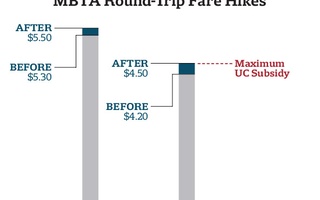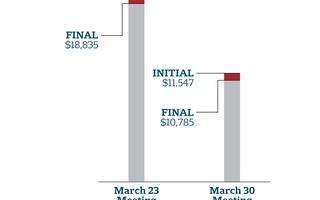The Finance Committee is the smallest and in many ways most select committee of the Undergraduate Council. Only one representative from each house and Yard region sits on the committee. Its deliberations have been described as secretive, regimented, and detached from the students it is meant to serve.
In contrast to the other two U.C. standing committees--Student Affairs and Campus Life--the Finance Committee meets in a small room in the basement of Canaday Hall, usually into the wee hours of the morning. And although, to my knowledge, none of the current committee members are smokers, the committee has often been likened to the "smoke-filled back rooms" of political infamy.
Invariably, after each biannual U.C. grants approval meeting--at which the final determination of student groups' grant awards it made--groups disgruntled with the process, and often the campus press, call for reform. What the vast majority of these protests have in common is a remarkable level of ignorance regarding the process by which grants are warded. As with many other issues that concern the U.C., a better understanding of the grants process is needed.
The Finance Committee this year has a budget of $83,000. This dwarfs the budgets of the other two committees and represents over two-thirds of student term bill contributions to the U.C. For this reason alone, students need to be better acquainted with what happens with the committee.
Furthermore, students who may never attend a U.C. concert or ride a U.C. shuttle bus are likely to be part of organizations which receive funding from the Finance Committee. The aim of this editorial is to educate these students and explain the process and, in so doing, demonstrate why drastic reform is not necessary and would likely be very harmful.
The Finance Committee was created 12 years ago to give students more of a voice in what happened with their financial contributions to Harvard. Specifically, the Finance Committee is charged with distributing money to the hundreds of student groups which exist on campus. Typically, a committee member will interview one or more members of each group that applies for a grant. There, the committee member will acquire all of the information necessary to make a presentation before the full committee with a recommended grant.
Last semester, 108 groups applied for grants. Each request was debated by the full committee, a process that can take anywhere from a few minutes to over half an hour. For each grant applicant, the committee recommends a grant amount after debate. Groups are notified at the end of this process of their recommended grant.
If dissatisfied with this recommendation, they may attend an amendments meeting a week prior to the final grants approval meeting. At the amendments meeting, student group can make a direct appeal to the committee for more funding. In some cases, the recommendations are revised upward.
Finally, on "Grants," each grant must be individually approved by the full Council. Again, groups still dissatisfied may appeal to the full Council. The grant award is not final until a majority of Council members have approved it. Once the process is completed, the groups may claim their money from the U.C. treasurer on a reimbursement basis.
By and large, this process is not what has aroused controversy. Rather, the source of the friction has been the criteria established by the Finance Committee to determine its grant recommendations, which in a solid majority of cases are ultimately approved by the full Council.
Because of the sheer volume of requests, the committee has established standardized costs for items which turn up regularly on grant applications. For example, postering for any event is $25, and security is $100. The cost of such activities varies, of course. It may be considerably more. But, the U.C. is not intended to be the sole funding source for student groups. In fact, groups are required to solicit funds from other sources of raise them internally.
Because of problems related to verification, the committee does not, as a rule, fund, things like telephone bills, gasoline, utilities, and postage. Activities which exclusively benefit members of student groups are likewise not funded. For instance, a newsletter delivered only in-house will not receive funding.
Activities which take place off the Harvard campus are ordinarily not funded. A major exception is made for community service groups, which by their very nature operate off campus.
A criterion which has often been criticized is the age of a group. Generally, younger groups are given preferential consideration, on the theory that they are most in need of U.C. funding whereas older groups may have established sources of outside or internal revenue. Finally, to remove ideology from the process, the grants process is content-neutral in terms of political ideology, religious of ethnic affiliation, etc.
Let me now address a few of the reforms that have been suggested. First, some students are outraged at U.C. funding for activities they deem frivolous or unworthy in some way. On this page last week, an editorialist decried the U.C.'s funding of the group AFARM (Association for the Absence of Rabid Moralism) because, in his words, AFARM is "a highly politicized group."
Read more in Opinion
The Conflicting World of Medieval FranceRecommended Articles
-
Amid Confusion, UC Finance Committee Aims to Improve Communication
-
 After MBTA Fare Hike, UC Augments Transportation Funding
After MBTA Fare Hike, UC Augments Transportation Funding -
 UC Cuts Funding, Introduces ‘Collaboration Bonus’
UC Cuts Funding, Introduces ‘Collaboration Bonus’ -
 UC Finance Committee Struggles to Enforce Event Attendance Rules
UC Finance Committee Struggles to Enforce Event Attendance Rules -
UC Establishes Procedure for Inquiry into Student Organization DishonestyIn response to concerns that clubs may be misrepresenting information, the Undergraduate Council’s Finance Committee wrote a formal procedure Sunday for conducting inquiries into student organizations accused of dishonesty in their UC grant applications.













